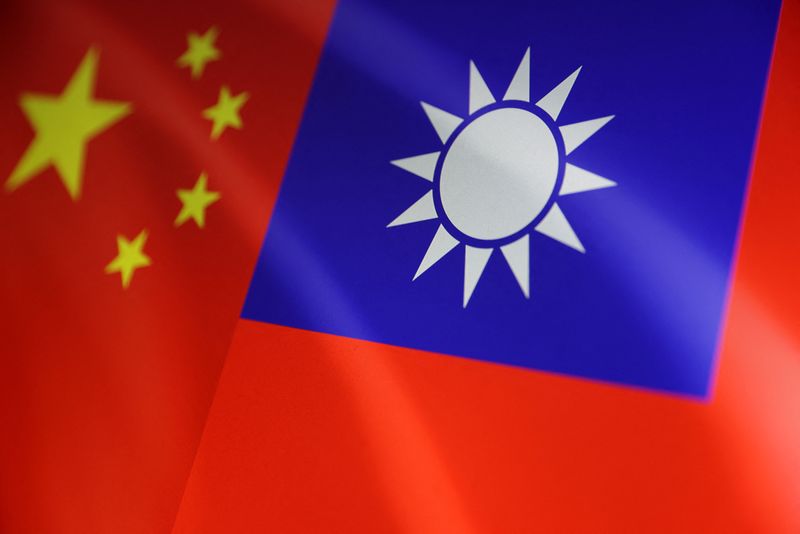By James Pomfret and Yimou Lee
HONG KONG/TAIPEI (Reuters) – The Chinese director of a company whose Taiwanese ship is suspected of damaging an underwater communications cable said on Wednesday there was no evidence the ship was involved, an incident that alarmed the Taipei government.
Taiwan’s coast guard said it sent a vessel on Friday to investigate a report from telecommunications provider Chunghwa. Telecom (BCBA:) that an underwater communications cable had been damaged off the northern coast of the island.
Upon arriving at the scene, he found the “Shunxin 39” with Chinese crew, registered in Cameroon and Tanzania, and asked to return it to Taiwan port for investigation.
In a statement, the Coast Guard said bad weather prevented it from boarding the vessel for verification, but it “cannot rule out the possibility” that the vessel was engaged in “gray zone” activities. . However, he provided no direct evidence of this.
Taiwan, which China claims as its own territory, has repeatedly complained about Chinese “gray zone” activities around the island designed to exert pressure on it without direct confrontation, such as balloon flyovers and sand dredging.
Taiwan’s Digital Ministry said the sea cable was cut on January 3, but service was not affected after emergency cables were activated.
Radio communications were exchanged with the ship, which is registered to a Hong Kong company called Jie Yang Trading, according to shipping records.
In his first public comments on the incident, Guo Wenjie, the director of Jie Yang, denied any involvement of the ship, while confirming that it was in the area. Taiwanese authorities did not arrest him after radio exchanges with the captain, he added.
“There is no proof,” he told Reuters by telephone, rejecting the accusation that the company was responsible for the damage. “I spoke to the captain of the ship and for us it was a normal trip.”
Speaking in Mandarin, Guo confirmed that the vessel was owned by Jie Yang Trading, as Hong Kong Companies Registry records show as having been established in 2020, with Guo as sole director.
His listed address in Hong Kong was a single room in a shared office space for a secretarial services company in a dingy industrial building.
China did not respond to requests for comment on the incident, while Taiwan, which strongly rejects China’s sovereignty claims, says communications were not affected.
In response to Guo’s comments, the Taiwan Coast Guard said it was not yet able to assess the ship’s “true intent” from tracking data.
The ship had remained in waters off northern Taiwan since early December until its broadcast signal was cut off on January 3, according to navigation data.
Guo declined to specify why the ship remained in the area, or the purpose of the trip, but said Taiwanese authorities had only asked for details of its GPS movements.
“I don’t understand why there has been so much news about this,” Guo said. “The ship had dropped anchor and therefore stopped in nearby waters.
“We followed normal rules and procedures. Otherwise, Taiwan would have investigated and arrested us.”
The incident alarmed Taiwan security officials, who are expected to brief Taipei-based diplomats this week, according to sources familiar with the matter.
“We need to inform everyone that such behavior does not only affect Taiwan. It could also affect international communications,” a senior Taiwan security official told Reuters, speaking on condition of anonymity because the issue is sensitive.
“This corresponds to the interests of many countries.”
Taiwan is particularly concerned about the vulnerability of underwater communications cables following incidents of complaints by Baltic Sea countries since Russia’s invasion of Ukraine in 2022.
Last month, Taiwan’s presidential office held its first “simulation” exercise involving government agencies other than the armed forces, simulating scenarios such as military escalation with China and a breakdown in international maritime links, reports said. those responsible.
In 2023, two submarine cables with the Matsu Islands, controlled by Taiwan and located near the coast of China, were severed, cutting off their 14,000 inhabitants from the Internet.

Authorities said at the time that initial findings showed a Chinese fishing boat and a Chinese cargo ship were behind the disruption, but there was no evidence that Beijing had deliberately tampered with the cables.
In recent years, Taiwan has worked to build up its capacity to deal with emergencies ranging from disasters to military conflicts, including alternative communications such as satellites if its international sea cables were cut.









